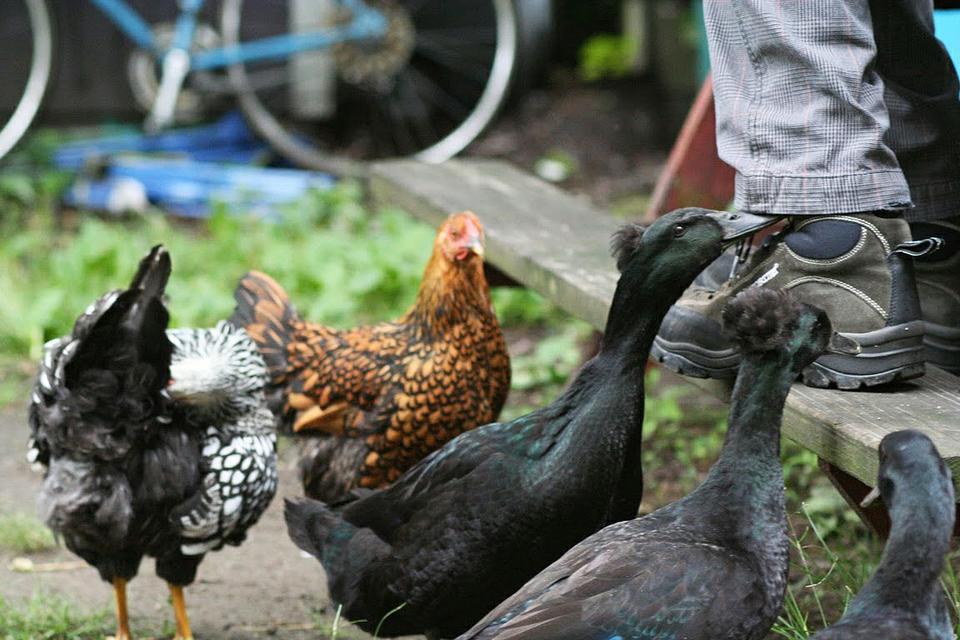
News
Summers Will Not Finish Semester of Teaching as Harvard Investigates Epstein Ties

News
Harvard College Students Report Favoring Divestment from Israel in HUA Survey

News
‘He Should Resign’: Harvard Undergrads Take Hard Line Against Summers Over Epstein Scandal

News
Harvard To Launch New Investigation Into Epstein’s Ties to Summers, Other University Affiliates

News
Harvard Students To Vote on Divestment From Israel in Inaugural HUA Election Survey
Birds in a Cambridge Yard Stir Neighborhood Trouble

When Cambridge resident Adam W. Fastman and his housemates on 218-220 Putnam Ave. first conceived the idea of raising chickens and ducks in their backyard, they did not foresee that their newfound “pets” would raise so much controversy among their neighbors.
Marcia C. Hamilton, 62, a lifelong resident of Cambridge, names herself as one of those disgruntled individuals. A barbed wire fence separates the yards of her home and, as she calls Fastman’s abode, the “purple house.” Since last spring, when the two chickens and three ducks were first brought into a constructed coop in the adjacent yard, Hamilton said she has been distracted by the unpleasant odors and loud noises that accompanied the birds’ daily habits.
Fastman argued that the chickens are of a carefully selected breed that does not make too much noise, and the smells had wafted from a pool of water that had been created for the ducks and removed at the start of winter.
Regardless, keeping a coop and raising fowl are illegal activities in Cambridge, Hamilton alleged, and for that reason, she called an inspector to her neighbors’ home.
Fastman, his wife Allison J. Fastman, and their housemate Blake R. Brasher—all co-owners of the birds—were issued a citation stating the illegality of owning a duck or chicken coop and growing livestock or fowl in Cambridge.
Before undertaking their fowl-raising project, the Fastmans and Brasher had researched Cambridge ordinances, and they noted the absence of “chicken coop” on the list of permitted uses—along with items like doghouses and bird feeders that can be easily found in many backyards, Fastman said. Finding no documented regulations against having chickens and ducks as pets in a backyard when they researched the city ordinances, the trio proceeded to build the coop and keep the birds by what they understood to be legal means.
The trio has been appealing the citation and contacted Cambridge City Councillor Henrietta J. Davis to locate the official wording of the zoning laws Hamilton cited.
Davis, who has contacted the city manager for an official report, has not yet responded to the housemates’ inquiry.
On Monday, Hamilton and a group of about 20 neighbors in opposition to keeping the birds attended the City Council meeting to voice their complaints. Fastman attended with a few of his housemates, expecting to hear from Davis about the city manager’s report. Instead, Fastman said they were bombarded by false allegations from neighbors, aside from Hamilton, who had never approached him, Allison J. Fastman, or Brasher in person to complain prior to that meeting.
The next hearing will be held on Feb. 11, and both sides of the conflict hope it will lead to some form of resolution.
Hamilton said that she is most concerned about health hazards the chickens and ducks pose.
“I want the chickens and ducks removed permanently—by force, if necessary,” Hamilton said.
Fastman, an IT manager at a robotics research and development firm, argued that no human has contracted avian flu in North America, and their chickens have not come in contact with other birds that can spread the flu.
Additionally, Fastman contended that the birds have improved his quality of life, and he hopes to keep them in his home, where they have lived since their arrival last spring.
“They’re lovely animals, they have their personalities, they’re very friendly,” Fastman said. “It gives us joy to keep things like this. It makes our yard feel more like home to us.”
—Staff writer Xi Yu can be reached at xyu@college.harvard.edu.
This article has been revised to reflect the following correction and clarifications:
CORRECTION: January 29, 2010
An earlier version of the Jan. 29 news article "Birds in a Cambridge Yard Stir Neighborhood Trouble" and the caption in the accompanying photo stated that Cambridge resident Adam W. Fastman and his housemates live on 218-210 Putnam Ave. The correct address is 218-220 Putnam Ave.
CLARIFICATION: January 29, 2010
An earlier version of the Jan. 29 news article "Birds in a Cambridge Yard Stir Neighborhood Trouble" did not clearly state whether the Fastmans and Brasher began their project with knowledge of its legality. In fact, the trio acquired their chickens and ducks with the understanding that such a move was legal in Cambridge.
CLARIFICATION: January 31, 2010
The article also stated that the chickens have not come in contact with "pigeons or other birds that can spread the flu." In fact, pigeons cannot contract the avian flu in the first place, as Fastman was told by Richard "Chicken Dick" Gonci, who was at the City Council meeting on Monday.
Want to keep up with breaking news? Subscribe to our email newsletter.
